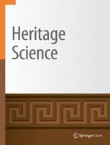2022 Citation Impact
2.5 - 2-year Impact Factor
2.7 - 5-year Impact Factor
1.526 - SNIP (Source Normalized Impact per Paper)
0.547 - SJR (SCImago Journal Rank)
3.9 - CiteScore
2023 Speed
10 days submission to first editorial decision for all manuscripts (Median)
105 days submission to accept (Median)
2023 Usage
1,194,912 downloads
904 Altmetric mentions











